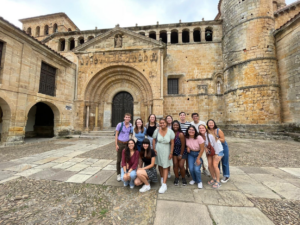
Participating in a study abroad program is a great way to learn a new language or improve your language skills. Being immersed in countries where the dominant language isn’t English will force you to utilize your second language and gain experience that you wouldn’t find in a classroom setting.
But what happens when you come back from your program? How do you keep the new skills you’ve earned while abroad, and how do you improve on them once you’re back home?
Speaking from experience, one of the main things stressed in foreign language classes is a constant input of your target language, so that you’re familiar with different sounds, accents, speeds, etc. One way to do this is to listen to music in your target language. Listening to music helps your brain become familiar with new words that you wouldn’t hear in your daily life.
Along with this, listening to podcasts and watching the news in your target language can be helpful. Newscasters typically enunciate their words, making them much easier to understand compared to speakers in less formal settings.

Try incorporating your target language into your daily routine. When I asked my study abroad classmates how they kept up their Spanish skills when we came back from Spain, they told me they listen to the radio in Spanish. They also watched episodes of Spanish TV shows, or read articles from The New York Times in Spanish.
Watching movies and TV shows are other ways to keep up with your second language. If you are beginning your language journey, I’d recommend re-watching shows or movies that you’ve already seen in your target language. That way, you will have an understanding of what is happening and you’ll be able to learn new words and phrases much more easily.
This also applies to reading articles and books in your second language. Begin by reading beginner articles or books. Reading books will also help you learn new vocabulary, and you’ll continue to be immersed in the culture of your second language.
You can also take courses in your second language once you’ve returned to The University of Texas at Austin, or engage with other on-campus resources, like the Texas Language Center. This is a good way to practice speaking in both an academic and a social setting. You may get to know people in your classes and practice speaking with them in your second language, including outside the classroom. Many international language organizations host tutoring sessions that support their main purpose, to help second language learners practice speaking and improve their language skills.

For example, UT offers flagship programs in languages like Portuguese and Arabic that offer mandatory tutoring for students to learn the language at a faster rate, as well as scholarship opportunities for learning a critical language, including more study abroad opportunities. At the end of these programs, they welcome students to conduct a capstone project abroad in Brazil and Morocco, respectively.
Studying abroad offers the best opportunity for immersion in a target language, but that doesn’t mean that the learning begins and ends with your time abroad. Whether your goal is to learn a language in a social setting, increase your academic voice, or even use a new language to talk to family members, there are endless opportunities to improve your language skills.
Karen Vasquez is an Education Abroad Peer Mentor providing support to students interested in studying abroad. Learn about this position and its services on the Peer Mentor Programs webpage.





